

Case study interviews or case interviews are different from a typical job interview—they challenge you to tackle real-world problems in real time. 🕰️
Instead of discussing past job experiences, you’re tested on your problem-solving skills. It’s like an audition, where, like performing a script, you craft innovative solutions to pressing business issues on the spot.
Top consulting firms use case interviews to assess candidates’ communication skills and critical thinking. Therefore, mastering the case interview style is crucial for many professionals seeking roles in consulting or strategic business positions.
Not sure where to start with your case interview preparation? 🧐
Our guide offers comprehensive strategies on how to prepare for a case study interview with a structured approach, including practical examples and mock interviews to help you excel.
Understanding the Case Study Interview
Whether you’re applying to your first job or looking for a career change, you must be prepared for case study interviews. 📝
What is a case study interview?
In a case study interview, you’re presented with a business problem or challenge you must analyze and solve. This interview style tests your ability to apply your current understanding of financial concepts and problem-solving skills to a simulated business scenario. Knowing how to prepare for a case study interview involves understanding the dynamics and time pressure of these interviews.
Why are case study interviews used?
Case study interviews are invaluable for employers who want to go beyond a potential employee’s theoretical knowledge and instead, want to evaluate practical application and strategic thinking.
- Observational insight: These interviews provide a direct view into how a candidate processes information, strategies and communicates under pressure
- Skill application: They evaluate the practical application of analytical skills, logical reasoning, and creativity in tackling complex problems
- Decision-making: Interviewers assess a candidate’s ability to make quick, informed decisions by analyzing their approach and solution to the case
- Real-world relevance: The business problem scenarios given in case interviews mirror real-world challenges, providing a clear picture of how a candidate might perform in actual job situations
- Interpersonal dynamics: This format also tests soft skills, like communication skills, teamwork, and presentation, which are necessary for consulting and management roles
Preparing for the Case Study Interview
Thorough preparation is key to succeeding in case interviews. Understanding the company’s business model, culture, and industry trends can significantly enhance your performance. Let’s look at some case study interview tips.
1. Research the company and the industry
Research is crucial as it helps you tailor your approach to company-specific challenges and opportunities. It shows your genuine interest in the company and demonstrates your ability to prepare and take initiative. Here’s how to maximize the benefits of your research:
- Deep dive into the company: Explore the company’s website, recent press releases, and news articles to understand its goals, challenges, and industry position
- Study industry trends: Familiarize yourself with the latest industry trends and benchmarks. This will help you make more informed suggestions during your case solutions
- Build competitor awareness: Identify major competitors and their strategies. Understanding what others in the field are doing to gain a competitive edge in your case analysis
- Research plan templates: Utilize structured research plan templates to organize your findings and streamline the research process. These templates help you systematically gather and analyze information so you don’t overlook the key details
ClickUp Docs
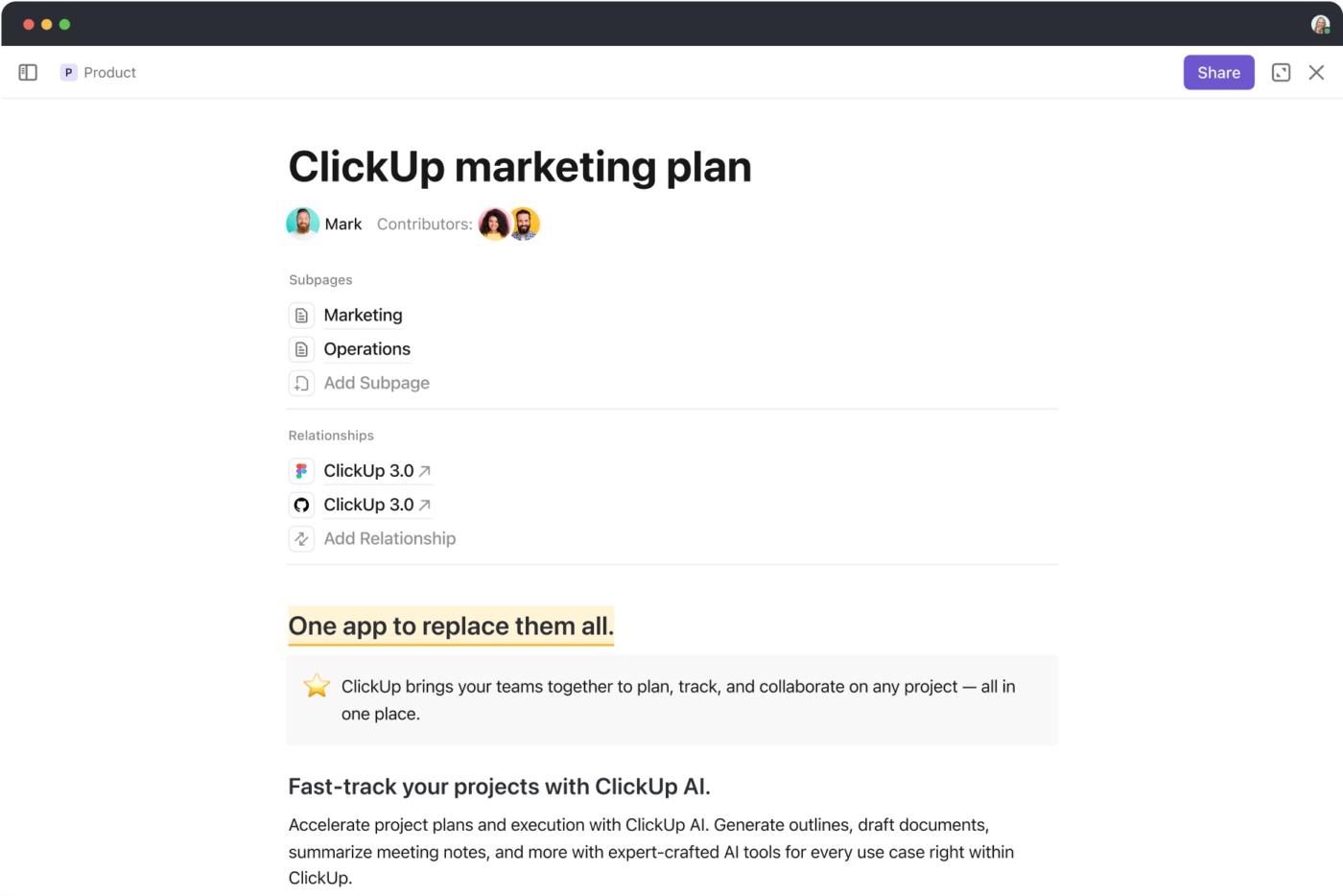
ClickUp significantly assists you in streamlining your research process for case study interviews. With ClickUp Docs, you can enhance how to prepare for a case study interview by organizing your notes, frameworks, and insights in one centralized location. You can also:
- Create dedicated docs for each company and industry you’re studying
- Use templates to maintain a consistent structure for easy reference
ClickUp Brain
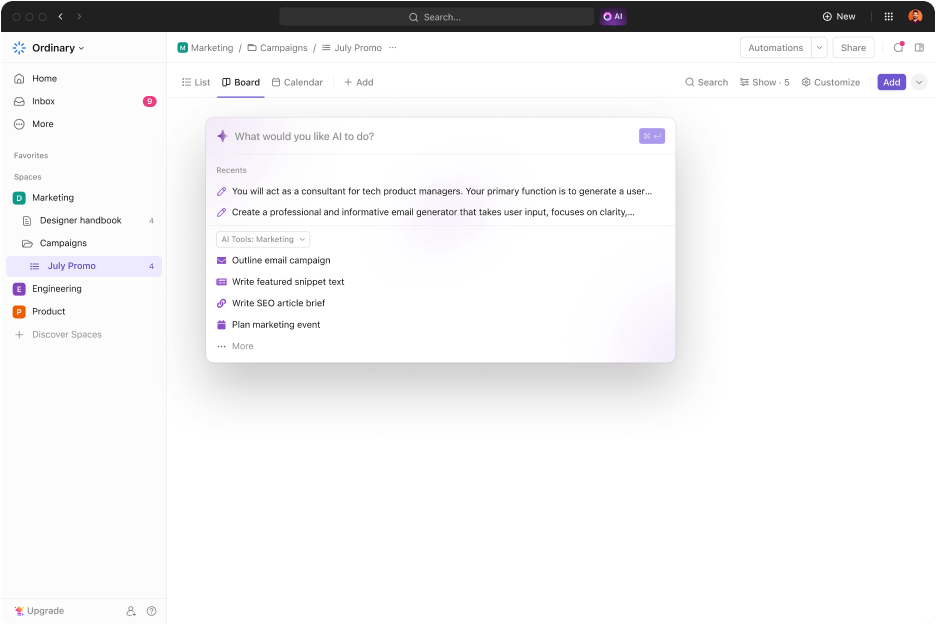
Moreover, with ClickUp Brain, ClickUp provides AI capabilities for interview preparation by helping you manage and synthesize your research. The ClickUp AI Knowledge Manager feature instantly delivers answers from your stored docs, while the AI writing tool helps you grow as a writer by restructuring and bettering your answers.
This ensures quick access to relevant information, crucial for tackling complex case interviews.
2. Practice case study problems
Practicing is fundamental when learning how to prepare for a case study interview. It is also vital for honing your analytical skills and refining your problem-solving process. Here’s how to make the most of your case interview preparation phase:
- Start with sample cases: Begin by tackling sample case studies that reflect the types of problems you might face in your interview. Many consulting firms and business schools provide these on their websites
- Simulate real conditions: Time yourself to get used to the pressure of thinking and responding quickly. This helps you manage time effectively during the actual interview
- Participate in peer review sessions: Practice with peers or mentors who can provide feedback and ask relevant follow-up questions
Leverage ClickUp for collaboration
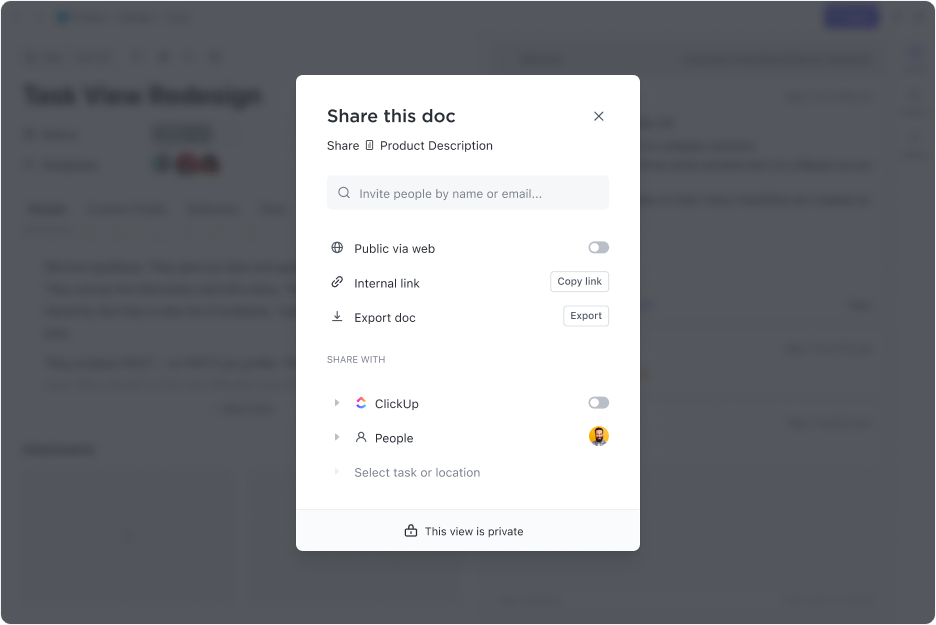
In addition to practical case studies, you must be prepared for common interview questions. Here’s how to use ClickUp Docs to improve this preparation:
- Document common questions: Create a document in ClickUp listing typical case interview questions. This might include questions like ‘Describe a time when you solved a complex problem’ or ‘How would you assess the market potential for a new product?’
- Organize your answers: For each question, draft potential answers. This helps in internalizing your approach and ensures that you’re ready for various scenarios
- Practice and refine: Use the rich formatting options in ClickUp to highlight your case interview questions and answers. There are different headers for different types of questions and tables to compare your responses over time
Use ClickUp Docs to organize your preparation and dynamically practice your answers. Edit and note the areas that need improvement, continuously refining your responses.
Besides, the ClickUp collaboration features let you easily share your work with advisors or peers for feedback, making your case interview practice sessions more effective and comprehensive.
After learning how to prepare for a case study interview, your answers will become more detailed and impressive. ✅
Answer before prep: “I think we should increase marketing efforts.”
Answer after the prep: “Based on our SWOT analysis, we can focus our marketing on social media platforms where our target demographic, millennials, is most active. This could include partnerships with influencers who align with our brand values.”
3. Develop various problem-solving frameworks
Multiple frameworks provide clear methodologies for analyzing business situations so you can systematically cover all necessary aspects of the problem. Some of these frameworks include:
I. SWOT analysis
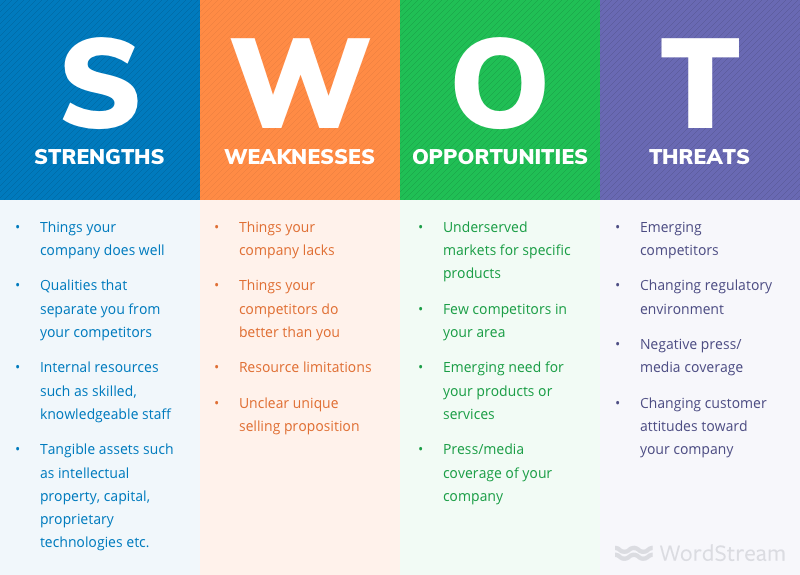
This framework helps evaluate a business or situation by identifying internal strengths and weaknesses and external opportunities and threats. It’s a simple way to assess a company or project’s strategic position and business problems.
Scenario: Consider a new organic snack company aiming to carve out its niche in a competitive market. 🍪
In a SWOT analysis, we start with Strengths. This company has a unique product line focused on high-quality, organic ingredients and a team experienced in food marketing, which gives it an edge in promotion. Understanding how to prepare for a case study interview can help identify and leverage such strengths in presenting strategic insights.
However, they face some Weaknesses. Limited brand recognition means they are relatively unknown, and higher production costs lead to more expensive retail prices. Their distribution channels are also limited, affecting their market reach.
On the upside, there are several Opportunities for growth. Increasing consumer demand for healthy snacks and potential partnerships with health food stores present chances to boost visibility. The expanding health-conscious demographic also offers a path for expansion.
Finally, the company must navigate certain Threats. Intense competition from established brands poses a significant challenge, alongside fluctuating organic ingredient prices and shifts in consumer preferences that could impact their appeal.
II. Porter’s Five Forces
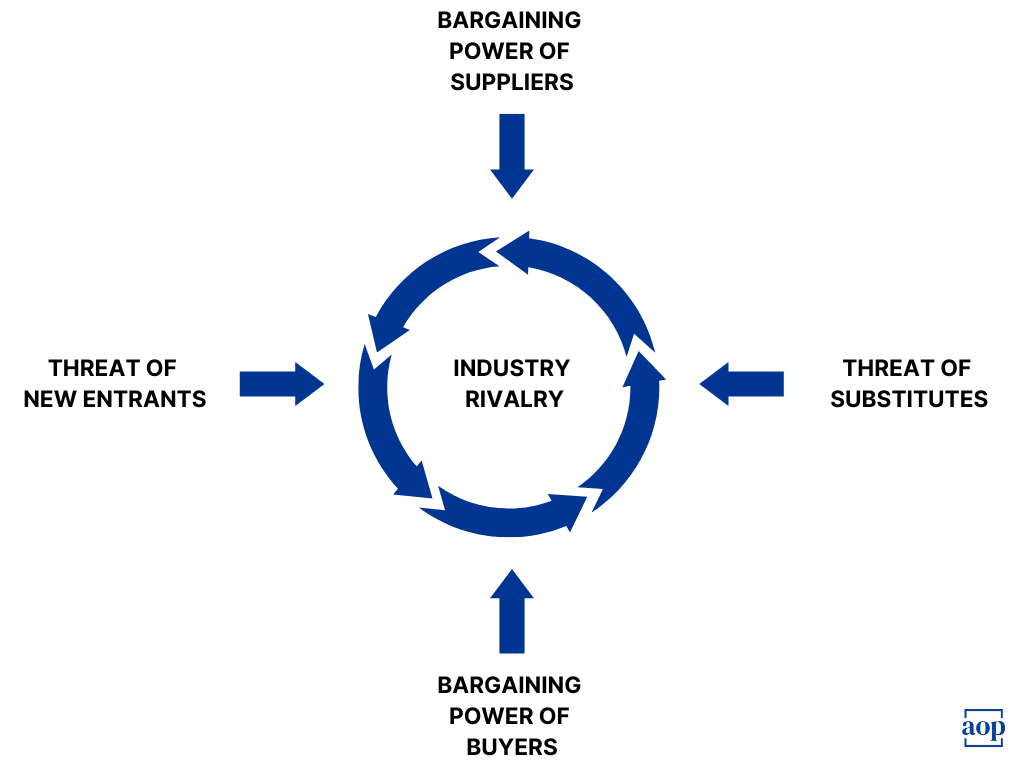
This tool assesses industry competition by analyzing five forces: Competitive Rivalry, Supplier Power, Buyer Power, Threat of New Entrants, and Threat of Substitutes. It helps you understand the competitive landscape and the factors that influence profitability.
Scenario: Imagine a startup developing a mobile payment app looking to disrupt the financial services industry. 📱
Using Porter’s Five Forces, we assess the Threat of New Entrants. Despite regulatory complexities, the barriers are low to moderate due to a welcoming tech sector.
Next, we evaluate the Bargaining Power of Suppliers. This is low, as many tech providers are available, making it easy to find necessary technology and services.
On the other hand, the Bargaining Power of Buyers is high. With many options available, customers can easily switch if they’re dissatisfied with features or user experience.
The Threat of Substitutes is moderate; traditional payment methods like cash and credit cards still exist, but mobile apps offer significant convenience.
Finally, Rivalry Among Competitors is strong, as established players dominate the market. The startup will need a unique value proposition to stand out.
III. 4Ps of marketing
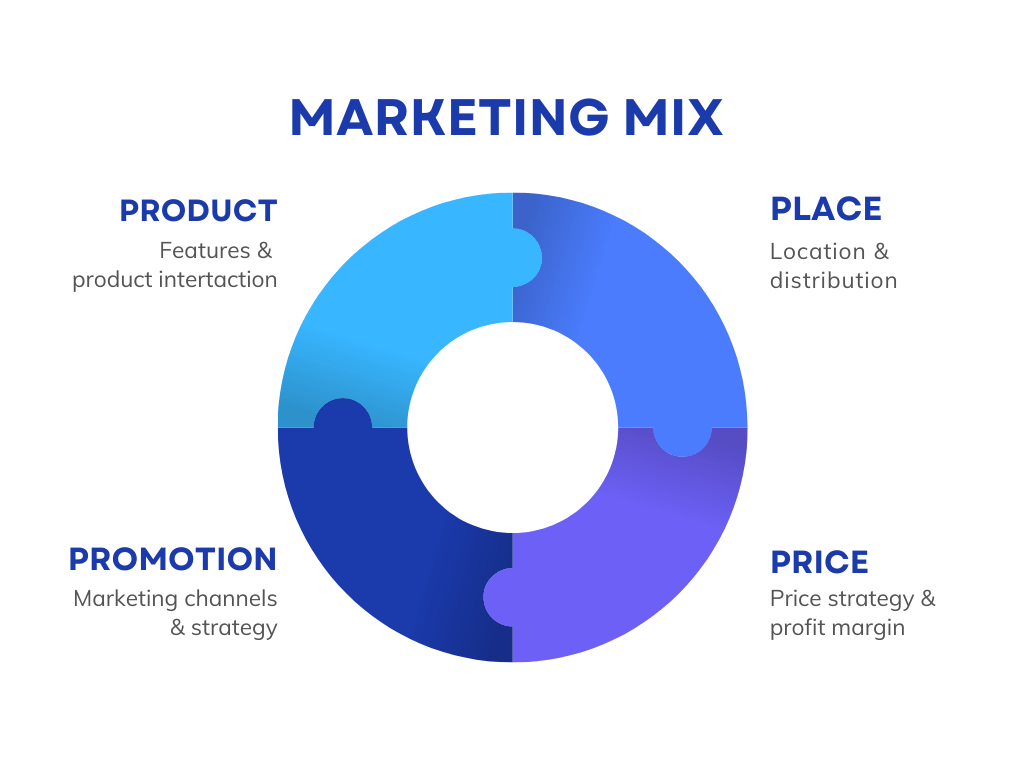
This framework focuses on the fundamental elements of a marketing strategy—Product, Price, Place, and Promotion. It’s useful for understanding how a company positions and promotes its product effectively in the market.
Scenario: Let’s explore a fitness app designed for busy professionals. 💼
Starting with the Product, the app offers personalized workout plans and nutrition tracking with video demonstrations, catering to the needs of individuals with hectic schedules.
In terms of Price, it adopts a subscription model with a free trial. The Basic Plan costs $9.99 per month for essential features, while the Premium Plan includes additional coaching options and costs $14.99 per month.
For Place, the app is available on iOS and Android platforms, marketed through online ads and partnerships with fitness influencers to enhance visibility.
Finally, regarding Promotion, the app utilizes digital marketing campaigns and collaborates with fitness influencers to share relatable success stories, building credibility and engaging users effectively.
Use ClickUp Brain to create a custom framework for your specific use case

ClickUp Brain allows you to create a strategic framework for all scenarios. Quickly pull up these custom frameworks during your prep sessions to practice applying them to different business problems and scenarios. Here’s how ClickUp Brain helps you master case interview preparation:
Schedule prep time efficiently: Set reminders and automate your preparation workflow with ClickUp Brain. Schedule interview prep sessions, breaking down each session by specific goals, such as reviewing frameworks or practicing mock interviews.
Track progress and skill development: Use ClickUp to create a comprehensive checklist of the skills and experiences you want to highlight during the interview. ClickUp Brain generates insights based on your tracked progress, identifying areas needing further attention.
It also helps manage your checklist dynamically, offering suggestions on showcasing key experiences or strengthening weak areas in real time based on your data.
Mock interview simulations: Get mock interview scenarios based on your industry of interest through ClickUp Brain. Use these scenarios to practice applying your frameworks in real time, preparing you for the dynamic environment of a case interview in consulting firms.
Instant framework guidance: Ask ClickUp Brain questions about each framework to deepen your understanding.
For example, you could ask, “What are the key elements of a SWOT analysis?” to get a quick refresher before diving into the application.
Integrating these tools and methods into your preparation provides a well-rounded and thorough approach, with practice cases, to mastering problem-solving frameworks. This will significantly boost your confidence and readiness and ensure you know how to prepare for a case study interview effectively.
Maximize your interview prep with ClickUp’s Interview Process Template
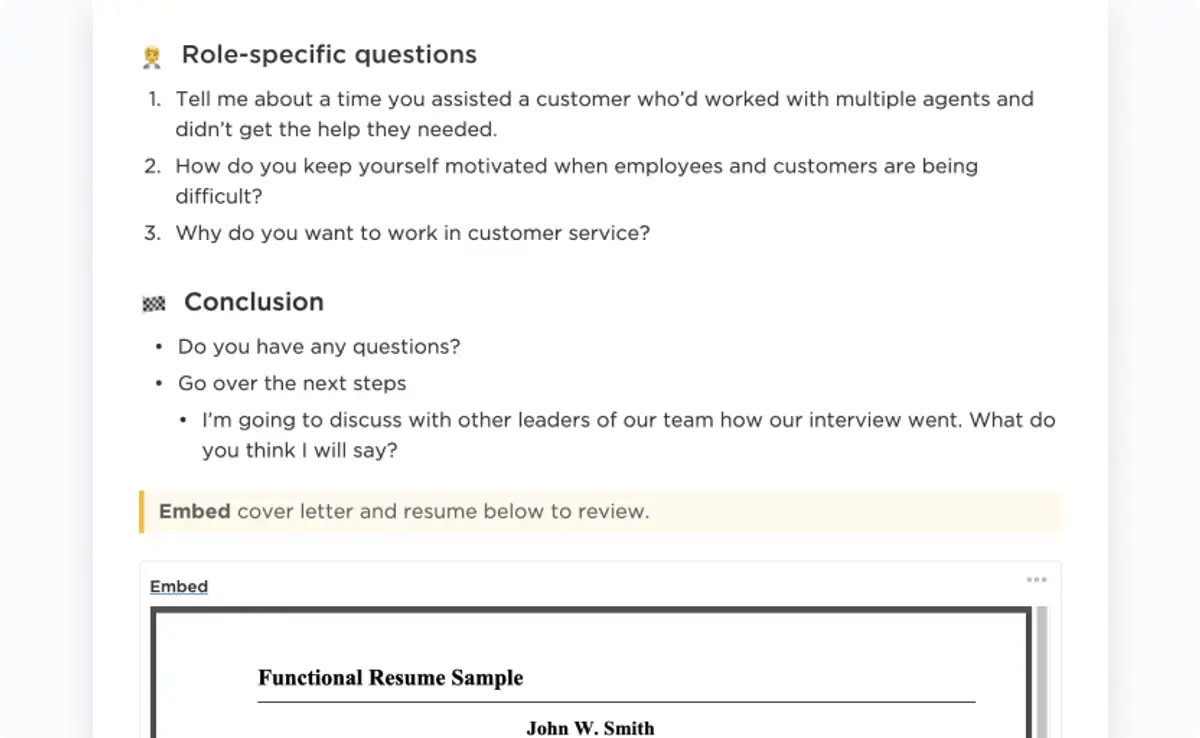
The ClickUp Interview Process Template is an effective resource for streamlining preparation for case study interviews. This template provides a structured workflow with customizable statuses and fields to effectively manage each case interview process stage.
- Set up and manage interview stages with custom statuses and fields
- Easily compare responses using Dashboards and reports
- Automate repetitive tasks like reminders and reviews
- Work with peers or mentors to refine your approach through collaborative tools
Besides this, there is also the ClickUp Job Search Template, which is a structured and efficient way to manage your job search process. The template helps you track job applications, set reminders for follow-ups, and organize interview preparation materials all in one place.
By centralizing tasks and deadlines through the various ClickUp tools, you maintain focus, stay organized, and enhance your chances of landing your ideal job.
Read More: Access 15 best case study templates to enhance your case interview preparations
Preparation checklist: Your step-by-step guide
Research the company:
✅ Reviewed the company’s website and recent news.
✅ Analyzed competitors and market position.
Understand the industry:
✅ Identified current industry trends and challenges.
Practice describing case studies:
✅ Completed practice cases and participated in mock interviews.
✅ Timed my responses to simulate real interview conditions.
Develop frameworks:
✅ Reviewed key frameworks (SWOT, Porter’s Five Forces).
✅ Created personalized frameworks based on practice cases.
Prepare common questions:
✅ Compiled a list of common case interview questions.
✅ Drafted and practiced responses.
Get feedback:
✅ Shared my solutions with a mentor or peer for feedback.
Manage stress:
✅ Developed strategies to stay calm before and during the interview.
The day before the interview:
✅ Reviewed notes and materials.
✅ Ensured I’m well-rested.
Steps to Follow During the Interview
During a case study interview, it is important to dissect and address the problem presented in a methodical, logical manner. Here are some strategic steps to help you effectively showcase your analytical skills and solution-oriented mindset.
1. Listen carefully to the problem
When you’re presented with the case, you have to remember the details carefully. Take detailed notes, and don’t hesitate to ask questions if something isn’t clear. Imagine you’re a detective gathering facts—each detail is a clue to solving the case.
2. Break down the problem
After grasping the case, start breaking it down into manageable parts. Think of it like sorting a puzzle into edges, corners, and centerpieces. Focus on different aspects, such as financial, operational, or strategic components. This approach enables you to tackle the problem systematically and avoid feeling overwhelmed.
3. Propose a hypothesis
With the pieces laid out, propose a hypothesis. Think of this as making an educated guess in a science project, where you predict what might happen based on the evidence you have.
📌 For instance, if the case study involves responding to an RFP from a government agency seeking a new health management system, your hypothesis could suggest focusing on scalability and security as primary selling points.
Explain your reasoning and how it fits into the larger picture of the case, ensuring your proposed solutions align with the client’s goals and constraints outlined in the RFP.
4. Communicate clearly and confidently
As you present your solution, speak clearly and confidently. Imagine you’re explaining your case solution to a client or senior manager—your clarity in communication will show your command over the subject and ability to understand complex information.
Read More: Explore guidance on how to message a hiring manager effectively.
Common Mistakes to Avoid
When preparing for a case study interview, it’s crucial to sidestep common pitfalls that derail your performance. Here are some critical mistakes to avoid when presenting yourself as a thoughtful and innovative problem-solver in your journey of mastering how to prepare for a case study interview:
1. Do not fail to ask for clarifying questions
Not having clarity about the questions will always lead to misunderstandings about the case problem. It’s essential to ask questions to ensure you fully grasp case interviews. This is like double-checking your directions before a road trip—ensuring you’re headed in the right direction.
📌 Example: A candidate hears a case about a retail company’s declining sales but doesn’t ask questions about the company’s market or customer demographics. They focus on irrelevant seasonal trends, leading to a solution that misses the actual problem, demonstrating a lack of understanding
2. Don’t rush through your analysis
Rushing through the analysis in case interviews often results in missing critical details or making incorrect assumptions. Take the time to analyze each part of the case thoroughly and build supporting arguments for your solutions.
📌 Example: Given a case about a manufacturing company needing cost reduction, a candidate rushes through the financials and misses examining operational inefficiencies. This oversight results in a superficial solution, as they cannot address key areas like supply chain management when questioned.
3. Think outside the box
Overlooking creativity in your solutions makes your responses seem generic. Employers value a candidate’s ability to think innovatively. Consider this as adding your unique seasoning to a well-known recipe—it’s your chance to stand out.
📌 Example: When tasked with developing a marketing strategy for a new tech app, the candidate suggests typical social media ads and influencer partnerships. This generic approach fails to differentiate the startup. A more innovative idea, such as a gamified user experience, could have showcased their creative thinking.
Read More: Explore 10 Career Map Templates to plan your professional journey strategically
Case Interview Examples: Q&A
Successfully navigating a case interview hinges on your ability to tackle real-world business scenarios with confidence and strategic insight. Understanding how to prepare for a case study interview involves familiarizing yourself with sample questions and practicing your responses. Below are some questions from sample case interviews:
Question 1: Management consulting strategy
Question: In your management consulting interviews with one of the top consulting firms, you are presented with an actual case interview scenario:
A leading retail company is experiencing declining sales despite market growth. How would you analyze the situation, and what would be your thought process to utilize your business sense skills to advise the company?
Answer: Here’s how I would analyze the situation to provide advice/consultation services:
Conduct a comprehensive market analysis to identify key trends and consumer behaviors that might impact the company.
then, use management consulting methodologies to dissect the problem, considering competitive dynamics and internal challenges.
Your thought process should include a SWOT analysis to pinpoint the company’s strengths and weaknesses while identifying opportunities for growth and potential threats. Based on data-driven insights, propose strategic initiatives to help the company regain its market position, emphasizing actionable steps demonstrating your business judgment skills.
Question 2: Product development
Question: Your client wants to launch a new smartphone. What factors should they consider to ensure its success?
Answer: Here are the factors I would consider to ensure my smartphone’s success:
Advise the client to research current market trends, consumer needs, and technological advancements. Stress the importance of differentiating the product through innovative features, competitive pricing, and catchy marketing. Suggest conducting focus groups and beta testing to refine product features based on direct consumer feedback before the full-scale launch.
Question 3: Marketing planning strategy
Question: How would you develop a marketing plan for a new fitness app targeting young professionals?
Answer: To define your marketing planning process in this case, start by identifying the key characteristics and preferences of young professionals, such as a focus on health, technology-savvy behavior, and a busy lifestyle.
Use market segmentation to tailor messages, choosing digital channels like social media and email marketing for outreach due to their high usage among the target audience. Propose a mix of content marketing, influencer partnerships, and targeted advertisements to build awareness and engagement.
Unlock Success in Case Interviews with Strategic Preparation
Excelling in a case interview demands a blend of understanding key strategies and rigorous practice. Mastering how to prepare for a case study interview ensures that you can effectively present your problem-solving skills and strategic insight.
Use ClickUp to deep-dive into case interview secrets, streamlining your preparation process and ensuring you’re thoroughly prepared to solve business problems and impress in any case interview setting. Ready to elevate your case interview skills?
Get started with ClickUp today and transform your approach to case interviews! ✨



